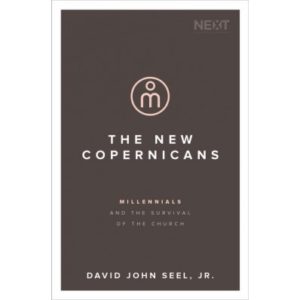 The New Copernicans: Millennials and the Survival of the Church David John Seel (Thomas Nelson) $16.99 ON SALE 20% OFF = $13.60
The New Copernicans: Millennials and the Survival of the Church David John Seel (Thomas Nelson) $16.99 ON SALE 20% OFF = $13.60
This is one of the brand new books I’ve been waiting for and am so glad it has released. It will be discussed much this year, I predict, and I am eager to tell you about it. The author is a cogent thinker and an excellent writer, drawing on excellent, important sources, making this a very fine book.
As always, you can order it at our sale price by clicking on our secure order form link at the end of this column.
I happen to know that Dr. Seel has worked long and hard to make this the best manuscript he could and it shows. This is not a simple overstatement of clichés about young adults and our postmodern world, but is a rather astute study of cultural trends and the rising generation of young adults, informed by the work of the likes of Charles Taylor. It is grounded in sharp sociological study and deep awareness of history and theology and what he calls a “frame shift.” Most deeply, I’d say, though, it is the cry from the heart of a dad who wants to see his own young adult kids and their friends remain or find their way into the church of Jesus Christ, living well for God’s Kingdom, amidst a culture that is shifting faster than most of us may realize. Will the church be there for them? Will their voices be honored and considered?
John is a church consultant, now, too, and obviously cares very much about the faithfulness and fruitfulness – indeed, the very survival – of the church.
Seel is clear – “Our millennial children, as well as nonchurchgoing millennials, are both the church’s greatest challenge and its most exciting new opportunity.” It can be a good opportunity, if, that is, we pay attention, if we find communication on-ramps such as those he outlines, and seek “genuine human connection.” Otherwise, we are in serious trouble as older church folks die off and only a meager portion of Christian youth endure to take up leadership role in the churches of tomorrow.
Indeed, this book is serious sociology, offered out of deep considerations for the church, and is informed by real conversations, facilitated by his own commitments to humility and listening.
In fact, it is this blend of scholarship and storytelling, this well-studied cultural discernment supplemented (and informed by) fascinating interviews and engaging episodes on the street, which makes The New Copernicans such an effective and enjoyable read. And such an important one, especially if you care about young people and younger adults.
BUT FIRST…
Please forgive me, or skip ahead, if this is annoying, but I want to circle back to the last BookNotes post about how many, including many younger people, are struggling with the identity and character of evangelicalism these days. In a way The New Copernicans is a must-read companion volume to Still Evangelical?
EVANGELICAL IS NOT THE SAME AS FUNDAMENTALIST
In the last BookNotes I explained a bit about the US faith tradition called “evangelical” in order to commend a new book called Still Evangelical? Connected to the word evangelism, and evangelists, it is a tradition that values sharing the good news and helping others come to a transforming encounter with Christ and His grace. It has spawned great evangelists – just think of Billy Graham, one of the handful who popularized the term and created this thoughtful, energetic movement out of a strict and anti-intellectual fundamentalism in the middle of the 20th century — but is also a broader, more complex conservative brand of Protestantism that should not be conflated with fundamentalism, let alone fundamentalist or Pentecostal televangelists. If you watch TV, it’s more Andy Stanley, Ravi Zacharias, or Beth Moore, than Jerry Falwell Jr., Pat Robertson, or the heretical prosperity preachers like Creflo Dollar or Paula White. Evangelical leaders are more serious and more thoughtful and more moderate than most media pundits realize. Evangelicalism in the middle of the 20th century was called neo-fundamentalism, and soon was called neo-evangelicalism because it grew out of and away from fundamentalism. Cru and Compassion International and CCO and IVCF and The C.S. Lewis Institute and CT and Relevant and the Council of Christian Colleges and Universities with their books and funds into working on racial justice and climate change and a renewal of the arts and sciences and the Gospel Coalition and Tim Keller’s City-to-City renewal efforts are a far cry from the God Hates Fags guy or the hard-ball, right wing political operatives that seem evangelical in name only.
CO-OPTED?
The mostly-moderate, formerly almost a-political evangelical movement was co-opted by the far Christian right in the later part of the 20th century; due to the initially well-intended desire for cultural reform, groups like the Moral Majority and others rallied churches to get involved in public affairs. It seems evident that the leadership of this movement became increasingly less interested in the gospel and gospel implications for Biblical politics and just adopted the principles of the far right wing of the Republican Party. (Republican evangelicals as diverse as Wheaton College grad and George W. Bush speechwriter Michael Gerson, who wrote Heroic Conservatives: Why Republicans Need to Embrace America’s Ideals (and Why They Deserve to Fail If They Don’t) and Southern Baptist leader Russell Moore, who has written Onward: Engaging the Culture without Losing the Gospel, have lamented this too often unconsidered blending of far-right politics and evangelical faith and how for some on the religious right, their partisan political passions trumped their religiosity.)
It has been well researched and well-documented how shrewd party operatives, including some hard-ball, vulgar, even atheistic ones, targeted the perhaps naïve evangelicals as important allies for a Republican renaissance. (Although they were slower to reach out to more liberal religious voters, the Democrats did the same thing, a decade later or so later, tailoring their partisan effort to the “faith community.”)
WE NEED THE CHRISTIAN MIND, ALSO ON POLITICAL THINKING
I have written widely in other BookNotes columns (here, here, or here) about what is wrong with this picture – in short, the Bible calls us to have a distinctive and theologically-informed Christian mind, which should yield a theologically-informed social theory; faithful followers of Jesus must nurture the Christian mind out of which can come intentionally non-ideological perspectives on public policy, shaped by the Biblical principles of justice and more. We sometimes call this “third way” thinking, the fruit of “integrating faith and scholarship,” but it is 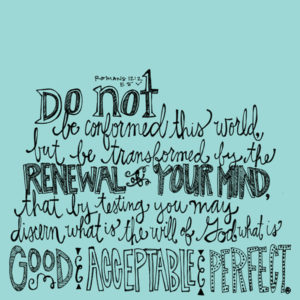 Biblically obvious that we are to “take every idea captive” and be “non-conformed to the ways of this world by the renewal of our minds.” This makes an intentionally Christian political option one that may lead us to be out of step with both major political parties; a prudent and Biblically-shaped sort of citizenship will most likely be less than enthusiastic with most candidates and policy formulations. As African American evangelical preacher Tony Evans puts it, when Jesus comes back He won’t be riding an elephant or a donkey. So our loyalty to any party on any side of the isles is provisional, submitted to our first loyalty to the Lordship of Christ and some consistent Christian political vision.
Biblically obvious that we are to “take every idea captive” and be “non-conformed to the ways of this world by the renewal of our minds.” This makes an intentionally Christian political option one that may lead us to be out of step with both major political parties; a prudent and Biblically-shaped sort of citizenship will most likely be less than enthusiastic with most candidates and policy formulations. As African American evangelical preacher Tony Evans puts it, when Jesus comes back He won’t be riding an elephant or a donkey. So our loyalty to any party on any side of the isles is provisional, submitted to our first loyalty to the Lordship of Christ and some consistent Christian political vision.
NO CHRISTIAN POLITICAL PRINCIPLES AT ALL
I say all this to bring up the obvious: the near take-over and partisan co-option of evangelicals in the Reagan years as the Moral Majority attempted to build a moral and somewhat Christian case for right wing politics is kid’s stuff compared to the ways in which the loudest religious Trump supporters now offer no coherent Biblical basis for their support. There is no theological or Christian political reflection offered by his inner circle of weirdo fundamentalist and Pentecostal advisers. I have argued with the late Jerry Falwell, Sr. about the Bible and public life (as did more astute leaders, from Jim Wallis to Ronald Sider) and while his lack of consistent Christian thinking was exasperating, one could at least have a debate. (Ditto with the former Southern Baptist political leader, the conservative Richard Land, just for instance.) However, the “religious” right of our times cannot even be argued with; as far as I can tell, most have no Christian principles for the public square, no Biblically coherent platform, they cite no Christian political thinkers, they are disconnected to the broad tradition of Christian social thinkers, from Augustine to Luther, Calvin to Wesley, Kuyper to Bonhoeffer.
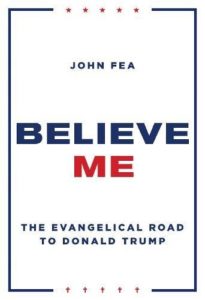 With a few noble exceptions, there’s just nothing of substance there. President Trump’s council of what evangelical historian John Fea calls “court prophets” (in Believe Me: The Evangelical Road to Donald Trump, a book coming out this summer from Eerdmans which you can pre-order now from us) are mostly not evangelicals in the historic sense (in my view) even though they use the word. The old line from the swordsman Inigo Montoya in The Princess Bride couldn’t be more apropos: “You keep using that word, but I do not think it means what you think it means.” Whether they are Evangelicals or Pentecostals or Fundamentalists, it seems to me that they are far from being studious, wisely Christian political thinkers who deserve to be informing a President. Christian citizens should not be swayed or deceived by them.
With a few noble exceptions, there’s just nothing of substance there. President Trump’s council of what evangelical historian John Fea calls “court prophets” (in Believe Me: The Evangelical Road to Donald Trump, a book coming out this summer from Eerdmans which you can pre-order now from us) are mostly not evangelicals in the historic sense (in my view) even though they use the word. The old line from the swordsman Inigo Montoya in The Princess Bride couldn’t be more apropos: “You keep using that word, but I do not think it means what you think it means.” Whether they are Evangelicals or Pentecostals or Fundamentalists, it seems to me that they are far from being studious, wisely Christian political thinkers who deserve to be informing a President. Christian citizens should not be swayed or deceived by them.
GOOD PEOPLE CAN DISAGREE, OF COURSE, BUT WE HAVE TO HAVE SOMETHING TO DEBATE ABOUT
This is not to say that there were not thoughtful Christian citizens who voted for Mr. Trump while holding their noses, thinking him the lesser of several evils; they put many eggs in the basket of Supreme Court nominees mostly to stop abortion and affirm religious liberty, and I can respect that. I am not now commenting on the wisdom of voting for Trump one way or the other, for those that have considered things seriously. Good people can disagree about the prudence and wisdom of voting for any particular candidate, but no one can say with a straight face that Mr. Trump is a Godly man or has any sort of theologically-shaped Christian political program or that most of his faith advisors are informed by evangelical thought about public life. I believe that those who speak as if Trump is a brother in Christ with righteous plans and Godly purposes have no coherent logic or theology or spirituality informing them and are disastrously wrong in failing to develop a Christian perspective on politics – what it is and what it isn’t. Again, fine and dedicated Christians can disagree about the content and shape and policies of a Christian political perspective, but we dare not offer enthusiastic, public support for any candidate without some reason, discerned with the Christian heart and mind, shaped by key Bible texts about government and political life, and coherently put together in light of what the broader church has generally said for centuries.
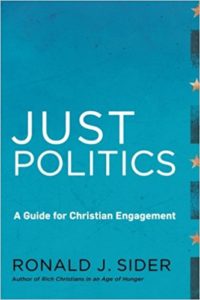
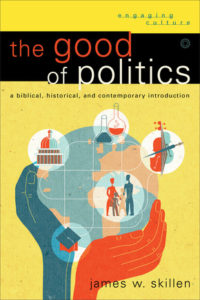 Ron Sider has wonderfully offered a fairly complex strategy for going through this process in his book Just Politics: A Guide for Christian Engagement (Brazos Press; $22.00) and it seems the least one could do is expect Christian leaders who speak about government to be fluent in this template, or something like it. Also, as I’ve described in BookNotes, CPJ founder James Skillen has offered an exceptional overview of the ways in which varying Christians down through church history have understood the Bible’s teaching on the task and role of the State in his The Good of Politics: A Biblical, Historical, and Contemporary Introduction (Baker Academic; $24.00.) Again, if one is advising a President of the United States – or hosting conferences and speaking out or blogging or writing about politics as a faith leader – and remains unfamiliar with this sort of content (at least) I submit you are disqualified from being taken seriously as a leader in this field.
Ron Sider has wonderfully offered a fairly complex strategy for going through this process in his book Just Politics: A Guide for Christian Engagement (Brazos Press; $22.00) and it seems the least one could do is expect Christian leaders who speak about government to be fluent in this template, or something like it. Also, as I’ve described in BookNotes, CPJ founder James Skillen has offered an exceptional overview of the ways in which varying Christians down through church history have understood the Bible’s teaching on the task and role of the State in his The Good of Politics: A Biblical, Historical, and Contemporary Introduction (Baker Academic; $24.00.) Again, if one is advising a President of the United States – or hosting conferences and speaking out or blogging or writing about politics as a faith leader – and remains unfamiliar with this sort of content (at least) I submit you are disqualified from being taken seriously as a leader in this field.
THE CURRENT FAITH CRISIS: STILL EVANGELICAL?
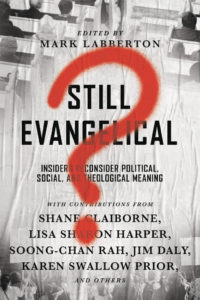 Which brings me to my quick reminder of the last BookNotes post and our promotion of the wonderful and very important book Still Christian: Insiders Reconsider Political, Social, and Theological Meaning edited by Mark Labberton (IVP; $17.00.) As we announced last week, we have this at 20% OFF (making it $13.60) and you can order it easily at our webpage’s order form page by following the link below.
Which brings me to my quick reminder of the last BookNotes post and our promotion of the wonderful and very important book Still Christian: Insiders Reconsider Political, Social, and Theological Meaning edited by Mark Labberton (IVP; $17.00.) As we announced last week, we have this at 20% OFF (making it $13.60) and you can order it easily at our webpage’s order form page by following the link below.
Still Evangelical?, as I explained, offers a set of essays and testimonies by various evangelicals about whether or not the recent public perception of evangelicalism as connected to the alt-right and the Trump platform, is fatal. Can we still in good conscience identify with a religious movement that has sold its soul for some right-wing secular pottage? Can those who know that the Bible teaches us to have solidarity with the poor, the prisoner, the refugee, the sick, continue to use the very word, evangelical, that has come to be seen as harsh to the poor, the prisoner, the refugee, the sick? Can those who want to emphasize salvation by grace alone continue to use that descriptor, evangelical, when so many so-called evangelicals have been reported to support obviously ungracious attitudes and policies? When some so-called evangelicals happily and loudly support a candidate that seemed proud of his sexual exploits, who has mocked the disabled, and spouted racist nonsense, it seems that the word and the movement it represents has lost its meaning. When the far religious right seems to offer comfort and support to a dangerous movement that may even be aligned with the neo-Nazis and the like, and when that fundamentalist movement is mislabeled as evangelical, what are real evangelicals to do?
One could, it seems to me, learn something about this mess by reading the fine big biography of Dietrich Bonheoffer, Bonhoeffer: Pastor, Martyr, Prophet, Spy: A Righteous Gentile vs. the Third Reich by Eric Metaxas (Nelson; $19.99) or other reflections on the German Christians who had to navigate a church largely accommodated to political ideology. (My own denomination, by the way, the PC(USA), has as part of its own Constitution, in its Book of Confessions, the famous anti-Hitler document, “The Barman Declaration” that insisted that if Jesus Christ was Lord, the fuehrer was not. This Bonhoeffer-related statement, while written in more awful times than our own, is relevant to any evangelical worried about accommodating faith to any partisan regime.)
As I tried to say in the last BookNotes review, Still Evangelical? is timely, urgent, and offers no simple answers, but it is a must for these very times; the authors are variously loyal or not so loyal to the name and the movement that converted and shaped them. If you haven’t, I hope you read my review, explaining why many folks should read these inspiring pieces.
They write out of the crisis of the last year or so, but the problem has been debated well for decades.
WE WERE WARNED ABOUT DEEPER MATTERS
In the early 1990s, in what seems a lifetime ago, a somewhat stuffy, conservative evangelical seminary professor named David Wells began a series of books (published by Eerdmans) offering a blistering critique of evangelicalism. In No Place for Truth: Or, Whatever Happened to Evangelical Theology and God in the Wasteland: The Reality of Truth in a World of Fading Dreams and Above All Earthly Pow’rs Wells eloquently warned about the way a drive to grow and succeed, fascinated with relevance and perception and power, influenced by the pressures of modernity such as markets and advertising and new technologies and, especially, postmodern assumptions about truth eroded evangelical fidelity. The revised second edition that came out last year of The Courage to Be Protestant: Reformation Faith in Today’s World (Eerdmans; $22.00) might be a good one to start with to understand Dr. Well’s sociologically informed but deeply theological approach. Or, at least, see a small staple bound booklet published by The Banner of Truth (now out of print) called The Bleeding of the Evangelical Church of which we have a left.
CHRISTLESS CHRISTIANITY
Nearly a decade ago a conservative, Reformed author, Michael Horton, published a blunt book called Christless Christianity: The Alternative Gospel of the American Church (Baker; $17.00) which lamented the shallow theology and self-affirming psychology of contemporary evangelicalism, warning that it will not end well. It remains a vital read for moderate mainline congregations and evangelicals that want to hold on to the first things of their gospel-centered orientation and he roundly pushed all of us to consider what we truly believe and why, and how it does or doesn’t stand firm on Christ the solid rock.
THE FUTURE OF OUR FAITH: AN INTEGENERATIONAL CONVERSATION
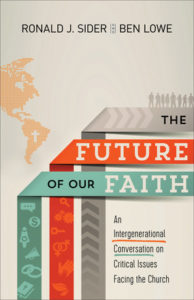 A book I really, really recommend (and that I highlighted here when it came out) offered a conversation back and forth between a wise and socially engaged older evangelical, Dr. Ronald J. Sider, and a younger, equally wise and socially engaged, younger evangelical, Ben Lowe. The Future of Our Faith: An Intergenerational Conversation on Critical Issues Facing the Church (Brazos Press; $18.99) is a great book on how the changes in our world in these new times (culturally and theologically) may or may not alter the very face of evangelicalism. That book was very interesting, and should have been read more widely than it was. It was a rare work that honored the fact that a younger generation of leaders are rising to take the place of older evangelical leaders and that there needs to be candid conversations about the different angles of vision. I respect both Ron and Ben and they agree on much, but it is their generational differences that make this a conversation so very well worth listening to. Written well before the Trump-era controversies, The Future of Our Faith: An Intergenerational Conversation explores questions of the future viability of evangelicalism itself, written by two fine insiders.
A book I really, really recommend (and that I highlighted here when it came out) offered a conversation back and forth between a wise and socially engaged older evangelical, Dr. Ronald J. Sider, and a younger, equally wise and socially engaged, younger evangelical, Ben Lowe. The Future of Our Faith: An Intergenerational Conversation on Critical Issues Facing the Church (Brazos Press; $18.99) is a great book on how the changes in our world in these new times (culturally and theologically) may or may not alter the very face of evangelicalism. That book was very interesting, and should have been read more widely than it was. It was a rare work that honored the fact that a younger generation of leaders are rising to take the place of older evangelical leaders and that there needs to be candid conversations about the different angles of vision. I respect both Ron and Ben and they agree on much, but it is their generational differences that make this a conversation so very well worth listening to. Written well before the Trump-era controversies, The Future of Our Faith: An Intergenerational Conversation explores questions of the future viability of evangelicalism itself, written by two fine insiders.
YOUNGER EVANGELICALS ARE MOSTLY NOT PART OF THE CHRISTIAN RIGHT
I find it interesting, by the way, and notable, that from the more liberal end of the spectrum of rising evangelical authors (think, for instance, of Rachel Held Evans or Jonathan Merritt or Shane Claiborne) to the more conservative young evangelical authors (think, maybe of Jefferson Bethke or Francis Chan or Priscilla Shirer) none of these vibrant leaders are part of the religious right. They just aren’t.
CHECK OUT JUBILEE
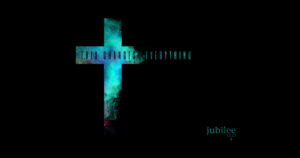 Just look at the beautiful range of speakers – many young – at the excellent Jubilee Conference for another glance at the shape of evangelicalism these days.
Just look at the beautiful range of speakers – many young – at the excellent Jubilee Conference for another glance at the shape of evangelicalism these days.
(You know we are very involved in this event organized by our colleagues in the evangelically-rooted CCO – you should come to Pittsburgh for this fabulous event! in it’s 43rd year telling a better story of what the gospel is as it relates to God’s redemptive work in all areas of life and culture.)
The younger voices of evangelicalism are not interested in the culture wars and frankly are holding out a more authentic vision of gospel ministry than many of their elders in the fundamentalist camp.
WHICH BRINGS ME TO THIS:THE STORY OF JOHN SEEL AND THE NEW COPERNICANS

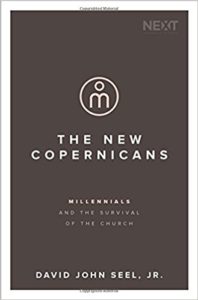 Which brings me to this, a book that I wish I could describe in greater detail, that I read in manuscript form months ago, and in which I have a strong endorsement in the inside, alongside all kinds of thoughtful writers, leaders, pundits, and cultural creatives. It’s called The New Copernicans: Understanding the Millennial Contributions to the Church by David John Seel (Nelson; $16.99) and it’s great. Really great.
Which brings me to this, a book that I wish I could describe in greater detail, that I read in manuscript form months ago, and in which I have a strong endorsement in the inside, alongside all kinds of thoughtful writers, leaders, pundits, and cultural creatives. It’s called The New Copernicans: Understanding the Millennial Contributions to the Church by David John Seel (Nelson; $16.99) and it’s great. Really great.
The book is wonderfully written and an excellent story of a middle-aged evangelical leader who learned perhaps the hard way of why we who are older must lean in and move towards the younger generation. We must take seriously the cultural concerns they bring and seriously engage the world they are creating and inheriting.
It starts with an ominous warning with a vivid telling of the disaster of the Titanic (and how it was warned, in fact, but the radio warnings never got to the bridge!) Oh my, I thought, as I finished this impressive overview, what if even half of this stuff is right? And what if our churches ignore the signals?
John Seel, the fascinating author of The New Copernicans: Understanding the Millennial Contributions to the Church is an old acquaintance who I have long admired.
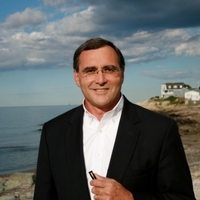 He wrote a small book years ago on why evangelicals should not capitulate to the culture, insisting that what we lose in accommodating to the culture too much is too high a price to pay to seem relevant. If perhaps the decline and sidelining of the mainline church at the end of the 20th century can be traced to their own capitulation to the intellectual and cultural trends of the previous century, Seel warned that, in like manner, the new evangelicals and their seeker-oriented mega-churches seeking to be relevant and influential, could end up similarly faddish and thin and compromised. I appreciated that a lot, by the way, although feared it seemed a bit smug, a bit too traditionalist, maybe even alarmist. But it was mostly right and full of insights from the likes of Peter Berger; I was the sort of reader who needed that reminder and rebuke.
He wrote a small book years ago on why evangelicals should not capitulate to the culture, insisting that what we lose in accommodating to the culture too much is too high a price to pay to seem relevant. If perhaps the decline and sidelining of the mainline church at the end of the 20th century can be traced to their own capitulation to the intellectual and cultural trends of the previous century, Seel warned that, in like manner, the new evangelicals and their seeker-oriented mega-churches seeking to be relevant and influential, could end up similarly faddish and thin and compromised. I appreciated that a lot, by the way, although feared it seemed a bit smug, a bit too traditionalist, maybe even alarmist. But it was mostly right and full of insights from the likes of Peter Berger; I was the sort of reader who needed that reminder and rebuke.
Dr. Seel co-edited a book on similar themes with a hero of mine, the eminent Os Guinness, which illustrated how sharp and learned John is. (To see what Os has been thinking and saying in recent years on these matters, still holding out a concern that we not be too placid in confronting the idols of the age, see his must-read The Impossible People: Christian Courage and the Struggle for the Soul of Civilization (IVP; $20.00) which is, as you would expect, a bracing, well-written, and very important read.)
After his work with Guinness, for many years Seel was the Headmaster of an exceptionally thoughtful classical Christian school, so, as you can see, his culturally conservative bone fides are exceptional.
He would not have written this book twenty years ago.
But, alas, life happens.
John’s kids grew up (he had nurtured them well, it seems, and his book about raising teens remains one of my favorites, Parenting Without Perfection: Being a Kingdom Influence in a Toxic World) and got involved in social justice ministries, standing with immigrants and hanging out with a Black Lives Matters group. They challenged him to get to know some of their friends, to hear well their concerns about the drift of our society and the way the 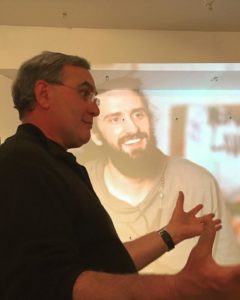 evangelical church, especially, seemed complicit in the status quo that created a culture too often blind to injustices, harmful to the Earth, and disinterested in beauty and wonder and imagination. The kids woke him up, to say the least.
evangelical church, especially, seemed complicit in the status quo that created a culture too often blind to injustices, harmful to the Earth, and disinterested in beauty and wonder and imagination. The kids woke him up, to say the least.
At the same time, as John explains in the preface of this remarkable book, he started to read and get to know some exceptional scholars and leaders who were influential in his own grappling with fresh ideas. These included the brilliant Sir John Templeton and historian Iain McGilchrist, the philosopher Charles Taylor, the missiologist Leslie Newbigin, and (I was delighted to hear) Christian teacher and philosopher of culture, James K.A. Smith.
Did I mention that Seel is one smart cookie?
GENERATIONS…
Also, it seems John had to take seriously the debates about “generational” thinking – I suspect he previously looked askance at the popular scholarship that makes confident generalizations about this or that generation. Of course we ought not overstate themes or attitudes that are common to a certain era or generation – believe it or not, not all young people in the late 60s were hippies and not all 90s youth were despondent slackers. Given how ubiquitous smart phones are and how many hours a day most kids spend in front of screens, it may be that there are unusually significant commonalities among this current iGen. See Jean Twenge’s much-discussed, sobering iGen: Why Today’s Super-Connected Kids Are Growing Up Less Rebellious, More Tolerant, Less Happy–And Completely Unprepared for Adulthood (Atria Books; $27.00) for one serious study of those born after 1995. If ever generalizations might be made, it might make most sense now. Since many evangelical kids were raised in churches organized around “contemporary worship” there are themes and tendencies and instincts that have been formed in significant ways by that, too.
So, it seems evident that John Seel is right: there are certainly some ways we can generalize and document trends and shifts and commonalities among cohorts. One hardly needs semiotics gurus like, say, the observant and always keen Leonard Sweet to point out that we 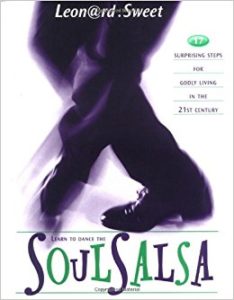 aren’t in Kansas anymore, Toto. (To know the texture and background and implications of the sea-change, Len Sweet is, by the way, still very important, and I commend his many books. His prophetic warnings made in remarkable books like Soul Tsunami or Aqua Church or Soul Salsa in the last century have all come true, from the rise of interactive TV shows to postmodern double entendres shaping our attitudes to the ubiquity of social media and the leading role of images alongside words. And, yes, the need to pay attention to the digital natives, those that were “born here” as he so colorfully put it.)
aren’t in Kansas anymore, Toto. (To know the texture and background and implications of the sea-change, Len Sweet is, by the way, still very important, and I commend his many books. His prophetic warnings made in remarkable books like Soul Tsunami or Aqua Church or Soul Salsa in the last century have all come true, from the rise of interactive TV shows to postmodern double entendres shaping our attitudes to the ubiquity of social media and the leading role of images alongside words. And, yes, the need to pay attention to the digital natives, those that were “born here” as he so colorfully put it.)
So, sure, there are certain tendencies and themes that might characterize certain generational cohorts.
THE NEXT CHRISTIANS
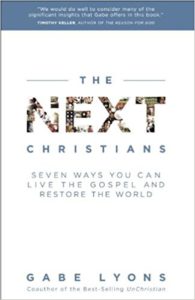 I recall a few years back when my friend Gabe Lyon wrote The Next Christians: Seven Ways You Can Live the Gospel and Restore the World (Multnomah Books; $15.99), a book I really, really like and still highly recommend. I quipped that I hoped he was right, that younger Christians had in fact shifted away from and to the stuff he describes in that book. I’m not so sure most young adults necessarily find themselves championing those shifts and seven new ways of understanding discipleship that Gabe lists, and I know a number of us elders have been calling for these exact changes for decades. But the point is well taken – younger church kids transitioning into adulthood, especially evangelical ones that are robust about their piety and in heavy conversations about the nature and demands of faith these days, really do seem to resonate with a new kind of evangelicalism.
I recall a few years back when my friend Gabe Lyon wrote The Next Christians: Seven Ways You Can Live the Gospel and Restore the World (Multnomah Books; $15.99), a book I really, really like and still highly recommend. I quipped that I hoped he was right, that younger Christians had in fact shifted away from and to the stuff he describes in that book. I’m not so sure most young adults necessarily find themselves championing those shifts and seven new ways of understanding discipleship that Gabe lists, and I know a number of us elders have been calling for these exact changes for decades. But the point is well taken – younger church kids transitioning into adulthood, especially evangelical ones that are robust about their piety and in heavy conversations about the nature and demands of faith these days, really do seem to resonate with a new kind of evangelicalism.
Again, just look at the upcoming Jubilee Conference to get a glimpse of a robust, full-bodied faith that isn’t primarily conservative or liberal, but about transforming al of life through the gospel of Christ and by sharing the goodness of God’s redemptive story.
And so, Seel has shed some of his rather doctrinaire conservatism, some of his high-class traditionalism, and some of his resistance to generational thinking.
INFORMED BY EXCELLENT SCHOLARSHIP AND ENERGETIC MINDS AND MENTORS
Inspired by these good scholars like Sir John Templeton and in conversation with important consultants (like Mike Metzger and Peter Enns and Sarah Withrow King – each very different, but bringing new insight and passion to his journey) Seel set out to see what in the heck is really going on out there.
I so admire his willingness to re-think some stuff in mid-life and his candor about that struck me as deeply admirable. Agree or not with all of his conclusions we should all applaud an author who changes his mind if his study and discernment and the bread trail of evidences lead a certain way.
DEEP PASTORAL LISTENING
He is not the first, by far, to do a deep dive into the cultural and philosophical and emotional shifts in contemporary young adult culture, but he is, I think, the best I’ve yet read. His take is both philosophically astute and experiential; he has listened to old scholars and younger kids; he has spent time in the library and on the streets, literally. His report from all of this listening and learning is wonderfully written, and surprisingly fresh – even if you’ve been down this road before, reading other stuff on Generation X or Generation Z or the Nones or whatever. The New Copernicans tells a great story and it is a great read.
If you care at all about the church, if you care at all about the culture, I am convinced, with Seel, that this is a topic you must study a bit. The New Copernicans: Millennials and the Survival of the Church is one good and pleasant and interesting way into the topic and the many voices in the conversation about it. Happily, it includes the voices of the generation being studied.
As Craig Detweiler, formerly of Pepperdine University, and now the new President of The Seattle School of Theology & Psychology, puts it, Seel has done “deep pastoral listening…” Read this remarkable quote (and not the only one with such robust enthusiasm):
Yes, yes, a thousand times yes. That is how many exclamation points, check marks, and underlines accompany my reading of John Seel’s The New Copernicans. He has clearly engaged in deep, pastoral listening in an effort to understand, affirm, and champion the next generation. This is theological sociology of the highest order. Utterly essential.
OKAY: HERE’S THE SCIENCEY BIT
 Of course, The New Copernicans works with a metaphor from Nicolaus Copernicus, the faith-based scientist in who influenced Galileo in the early 1600s. (Come on, cue the Indigo Girls song Galileo right about now.)
Of course, The New Copernicans works with a metaphor from Nicolaus Copernicus, the faith-based scientist in who influenced Galileo in the early 1600s. (Come on, cue the Indigo Girls song Galileo right about now.)
That is, Seel nicely frames the conversation about and with young adults by a bigger story of social change in the modern era. It’s a big, big story very nicely told – he’s in some similar territory as Pete Enns in his The Sin of Certainty: Why God Desires Our Trust More Than Our ‘Correct’ Beliefs (HarperOne; $25.00) that documents in a lively combo memoir and theological reflection 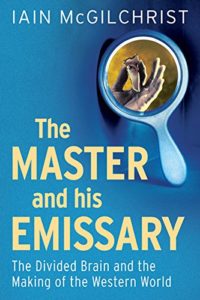 the faithfulness of a post-realist epistemology, exposing the dangers of a faith built on the search for certitude. Seel also draws heavily on the exceptionally potent, sprawling book by the fascinating Iain McGilchrist, The Master and his Emissary: The Divided Brain and the Making of the Western World (Yale University Press; $25.00) which offers a study of left-brained vs. right-brained thinking as a conceptual key to understand the ping-ponging in Western culture between rationalism and romanticism, between the rigid dominant culture and the passionate counter-culture. For those paying close attention, this is not too dissimilar, but a lot more interesting, than the Dutch Kuyperian neo-Calvinist philosopher Herman Dooyeweerd’s schema as explained in books like The Roots of Western Culture.
the faithfulness of a post-realist epistemology, exposing the dangers of a faith built on the search for certitude. Seel also draws heavily on the exceptionally potent, sprawling book by the fascinating Iain McGilchrist, The Master and his Emissary: The Divided Brain and the Making of the Western World (Yale University Press; $25.00) which offers a study of left-brained vs. right-brained thinking as a conceptual key to understand the ping-ponging in Western culture between rationalism and romanticism, between the rigid dominant culture and the passionate counter-culture. For those paying close attention, this is not too dissimilar, but a lot more interesting, than the Dutch Kuyperian neo-Calvinist philosopher Herman Dooyeweerd’s schema as explained in books like The Roots of Western Culture.
So Seel is telling this bigger story of culture and how the younger generation finds itself within these paradigms and shifts within our age. And he works this Copernicus thing to great effect.
In a wonderful foreword by Eric Swanson, the metaphor is introduced and explained by telling a bit about the famous book Galileo published in 1632 that took the form of a dialogue (between one character who represents the Copernican heliocentric view and the other, who represents the Ptolemaic/Aristotelian geocentric viewpoint. “The book was not without its controversies,” he wryly notes. Well, yeah. Galileo, as most know, was condemned of heresy for rejecting Aristotelian views and placed under house arrest for the rest of his life. His book was put on the infamous Index of Forbidden Books where it remained until 1835!
(Read that last sentence again. Aren’t you glad you tune in to BookNotes to learn this stuff?)
As Swanson continues,
Galileo was a man caught between shadow and substance, in that liminal space where the world was changing. The established church held to the Ptolemaic view of the universe and they had the verses to prove it, “He set the earth on its foundations/it can never be moved…
…Galileo was a Copernican caught in an Aristotle age. Everything about his experience told him reality was different that what the established order was telling him. He was seeing the world through different lenses with different implications. He carefully brought facts and evidence to the bench, but old entrenched ideas, theories, and believes have a stickiness that is hard to displace. He couldn’t find a place at the table….
Today a new generation of Copernicans is emerging – those John Seel identifies as the New Copernicans – who are experiencing and navigating life in a way that is different than their spiritual ancestors. This shift in frame is just as profound as going from a geocentric to a heliocentric view of the solar system. And like Copernicus, they are generally not taken seriously. The New Copernicans are modern explorers. Many are millennial, but other generations are part of this journey as well.
Swanson’s few pages are themselves wonderful reminders of what is at stake. After a helpful summary of much that characterizes today’s younger generations, he notes:
John Seel helps us understand the why behind the whats and hows. This book serves as a primer to introduce how an increasing number of people are thinking and experiencing life….
Today the New Copernicans are here. They bring with them new ideas, new approaches, and new perspective we have not considered or perhaps even heard before. As Apple Computer said about such pioneers in their advertising, “You can quote them, disagree with them, glorify or vilify them. About the only thing you can’t do is ignore them.” We cannot dismiss them. We’ll need to embrace a fresh humility that breaths, “for we know in part…” (I Cor. 13:9) and ask for help from others on our common journey. I hope John Seel will be part of that journey for all of us.
Which is why this book is so important. My fear is that those who need it most — which is most church leaders, as far as I can tell — won’t care enough to read it. If you order it from us, I will be grateful, but, more, you congregation will be glad. It’s important; urgent, even. The subtitle about “the survival of the church” isn’t hyperbole.
OVERVIEW OF SIX PARTS
Here is an overview of the book’s excellent structure. My descriptions don’t do the lively prose justice. The chapters are short and the whole book is very lively with much to ponder and, hopefully, discuss with others.
At the end of each chapter there are, in fact, “take-away” bullet points so you can recall the most salient matters, and excellent discussion questions. This makes TNC a great small group study.
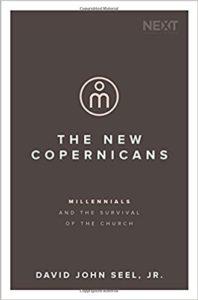 There are six major parts to TNC.
There are six major parts to TNC.
Part One has five short chapters exploring “An Ignored Warning.” This is hard stuff, reminding us that young adults are leaving the church, that evangelical congregations, too, are declining, and that if we project the loss of younger folks into the future, we will be facing a perhaps unprecedented disaster. He introduces some “left braining thinking” to explore the legacy of the rationalism of the Enlightenment. Whew, this is important stuff.
Part Two has several chapters under the rubric of “Sizing Up the Impending Frame Shift” and looks at the visible shift in culture and what characterizes the spirituality of the newer generation. “All Who Wander Are Not Lost” he reminds us and explores the role of experience (“before thinking”) as we come to appreciate the way many folks these days take in their life and times. He does this without judgment or critical assessment, as his project is to help us understand and appreciate the way in which the rising generations do life – like it or not. (And, there are good reasons to like the approach of the new Copernicans, which is another strength of the book; perhaps we older ones don’t only have to hear and understand these new ways, but perhaps these new ways are more right than we first thought!) In this regard, this is a lovely and good way to enter this arena, less as a critic and more as an explorer and learner.
Part Three offers assessment of several classic responses to the warnings. There is self-righteous blindness, there are the religiously tone-deaf, he explores the “haunted doubters” and calls us to “humility in theology.” Seel may be hard on some of us in these sections, but it is important stuff. I hope you take it in, study the take-aways, and have folks around you to talk through the reflection exercises.
Part Four offers a handful of heavy chapters – not too heavy, though, as he tells stories and gives examples – of how to better understand the shift in frame. This draws on Charles Taylor a bit, and on Jamie Smith’s insights found in How Not To Be Secular: Reading Charles Taylor. This applies those insights with wonderful skill, and you are sure to learn something fresh from these colorful chapters. His emphasis, again, on experiential learning, on “boutique hospitality” and on the differences between “verbs and nouns” as we realize the different way people view relationships are all very stimulating. I could tell more about his take on “court jesters” and what it means to be in this “haunted” era (to use Taylor’s image for the not-fully-secular age.
Part Five offers four “survival strategies” and I commend these to anyone wanting to have a lasting, healthy relationship with younger adults these days. Certainly church leaders must grapple with these concerns, wondering together how to embody justice and beauty and love and spirituality
Part Six offers inspiring if challenging reflections on “What Crisis Leadership Demands.” These are short chapters, but moved me deeply as he explores, anew, what it may mean to be faithful as evangelicals, within the current habitus. One chapter ponders the way in which older, white evangelicals supported the Trump movement, and, naturally, raises important questions about where we go next. This is very important stuff, and I cannot underestimate how useful and insightful and good these pages are.
Here are just a few of the remarkable writers and leaders who have endorsed this new book. Interestingly, folks from across the theological spectrum, too, have offered encouragement to read The New Copernicans. From liberal mystic Richard Rohr to neo-Calvinist James K.A. Smith, from conservative Catholic Christopher West to the post-modernish podcaster Science Mike, from Reformed artist and cultural steward Mako Fujimura to President of the campus ministry CCO Vince Burens, from prestigious UVa scholar James Davison Hunter to Karen Covell of the Hollywood Prayer Network. Not to mention one by a small town bookseller Byron Borger, right across from one by an RUF campus minister, Chase Daws, who says he is “beyond grateful for this work.”
Yup. In fact, I wrote several blurbs, and they are all shown at John’s New Copernican website. Man, I seem like such a fanboy.
I loved these very fine blurbs, some from people I really trust; I hope you find them compelling:
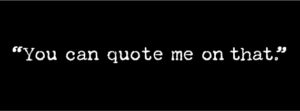
“John Seel begins The New Copernicans innocently enough, with two unassailable sociological facts about the millennial generation. They are leaving the evangelical church and they embody a significant shift about how reality and truth are apprehended and lived. Old news, you say. But Seel wants us to reconsider what’s really occurring. Young adults are abandoning the church, he says, because the church is needlessly alienating them. And although the church is aware of the cultural shift in thinking and living, just about everything the church believes about it is wrong. “This new way of processing reality,” he argues, “is not only different—but better. If evangelical leaders will take it seriously, it will make the church more like Jesus.” You owe it to yourself to let Seel make his case even if you don’t agree at every point. That goes double if you are a leader in the church. And if you are a parent or grandparent, The New Copernicans will help you better listen to and love the young adults in your life.”
—Denis Haack, director, Ransom Fellowship and editor, Critique
Do not miss reading this book. Full of wisdom, research and passion, John Seel helps us to view this tectonic shift toward millennials’s influence in culture as a generative opportunity. As an artist, I have seen this shift already taken place in the art world for some time now. The ‘iceberg’ is right in front of us! It’s now the churches responsibility to respond to principles that John carefully traces in this fine work.”
—Mako Fujimura, artist, vision director of Brehm Center, Fuller Theological Seminary
“John Seel’s The New Copernicans, is a godsend. He makes the compelling case that the millennials can help us understand our cultural moment as well as our own faith. This insightful cultural analysis of the millennial generation and the modern evangelical church comes with a warning label: disregard at your own peril.”
—Frank A. James III, president, professor of historical theology, Biblical Theological Seminary
“I’m a millennial as well as a college professor and a cultural critic, and I find John Seel’s way of thinking about my generation compelling and grounded in a generosity that’s extremely rare. I wish I could put a copy of this book into the hands of every person tasked with leading the church.”
—Alissa Wilkinson, English professor at The King’s College and film reviewer at Vox
“We are, I believe, in the midst of a shift in the plate tectonics of American religious culture. A work like Taylor’s A Secular Age has resonated because it has so accurately uncovered the genealogy that leads to this moment. What has been missing, however, is the kind of careful listening to and nuanced observation of those who are the vanguard generation of this shift. The New Copernicans fills this gap, providing important insights into this massive generational shift.”
—James Davison Hunter, author, To Change the World
“Life is full of landmarks to be discovered. Great explorers find them, note them, and keep going forward learning by what they see and experience. They then tell others so they can see also. In The New Copernicans John Seel is a great explorer pointing out the landmarks of a new reality that is dawning and will touch every aspect of the church and life in general. John’s insights paint the picture of a way forward in these turbulent times that are bursting with exploration and opportunity for those who have ears to hear.”
—Dwight Gibson, Chief Explorer, The Exploration Group, DVD For the Life of the World
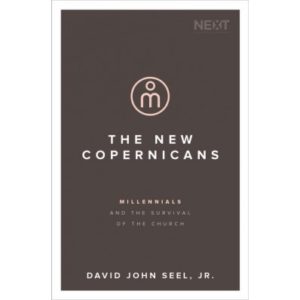
BookNotes

SPECIAL
DISCOUNT
ANY ITEM MENTIONED
20% Off
order here
takes you to the secure Hearts & Minds order form page
just tell us what you want
inquire here
if you have questions or need more information
just ask us what you want to know
Hearts & Minds 234 East Main Street Dallastown, PA 17313
read@heartsandmindsbooks.com
717-246-3333
